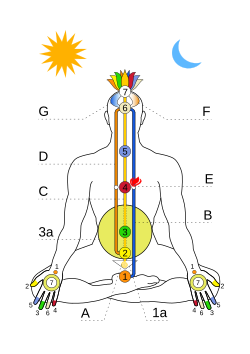| Yoga-kundalini Upanishad | |
|---|---|
 Yoga-Kundalini Upanishad is a yoga text | |
| Devanagari | योगकुण्डलिनी |
| Type | Yoga |
| Linked Veda | Krishna Yajurveda |
| Chapters | 3 |
| Verses | 171 |
The Yoga-kundalini Upanishad (Sanskrit: योगकुण्डलिनी उपनिषत् IAST: Yogakuṇḍalini Upaniṣad), also called Yogakundali Upanishad (Sanskrit: योगकुण्डल्युपनिषत्, IAST: Yogakuṇḍalī Upaniṣad),[1] is a minor Upanishad of Hinduism.[2] The Sanskrit text is one of the 20 Yoga Upanishads and is one of 32 Upanishads attached to the Krishna Yajurveda.[2] In the Muktika canon, narrated by Rama to Hanuman, it is listed at number 86 in the anthology of 108 Upanishads.[3]
It is a highly significant text related to the exposition of the Kundalini Yoga,[4] describing Hatha and Lambika yoga; the last chapter is primarily about the quest of self-knowledge, Atman, Brahman (the Non-dual Brahman)[4] and living liberation.[5] It is an important text in Tantra, the Shakti tradition of Hinduism, and is considered one of the most important texts on Kundalini Yoga.[6][7]
According to the Yoga-Kundalini Upanishad, "even as fire in logs of wood will not rise without churning, so also without the practice of Yoga, the light of knowledge cannot be lit".[8] Chitta, or mind, is explained in the text as a source for Samskaras and Vasanas (behavioural tendencies), as well as an effect of Prana. Yoga techniques to become aware of and to control Prana are elaborated in the Upanishad.[4] These techniques include Mitahara (moderate, balanced nutrition), Asana (posture exercises), and shakti-chalana (awakening inner force) are asserted to be the means to arousing a yogin's Kundalini.[9][10]
- ^ Gerald James Larson (2008), The Encyclopedia of Indian Philosophies: Yoga: India's philosophy of meditation, Motilal Banarsidass, ISBN 978-81-208-3349-4, pages 615–616
- ^ a b Ayyangar 1938, p. 251.
- ^ Deussen, Bedekar & Palsule 1997, pp. 556–57.
- ^ a b c Warnick 2015, p. 217.
- ^ Ayyangar 1938, pp. 251, 274–278.
- ^ Vana Mali (2008), Shakti: Realm of the Divine Mother, ISBN 978-1-59477-199-6, pages 311–314, Quote: "The Yoga-kundalini Upanishad is the eighty-sixth among the one hundred and eight important Upanishads. It is a most important work on kundalini yoga."
- ^ Mary Scott (2007), The Kundalini Concept: Its Origin and Value, Jain Publishing, ISBN 978-0-89581-858-4, pages 1–14
- ^ Ayyangar 1938, pp. 273–274.
- ^ Warnick 2015, p. 218.
- ^ Ayyangar 1938, pp. 264–271.